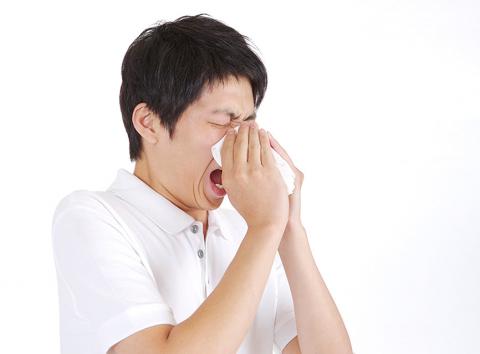Influenza and gastroenteritis were among last year’s top 10 causes of people visiting doctors during and after the Lunar New Year holiday, the National Health Insurance Administration said yesterday, urging people to look after their health.
In the week following last year’s holiday, more than 1.7 million people sought treatment for influenza, while 316,161 people went to hospitals because of gastroenteritis, agency data showed.
They were also the top two illnesses causing 3,000 to 6,000 people per day to seek emergency treatment during the holiday over the past three years, the data showed.

Photo: CNA
Lower back pain, high blood pressure, allergies, soft tissue diseases, diabetes with complications, eye inflammation, upper respiratory tract infection and diabetes without complications rounded out the top 10 diseases, the agency said.
People who are having problems sleeping because of the celebrations should avoid taking sleeping pills, as these are prescription drugs and might be habit-forming, the Food and Drug Administration (FDA) said.
People with insomnia should avoid drinking too much water and caffeinated drinks before going to sleep, the FDA said, adding that overly fatty and spicy foods might disrupt sleep.
Flu, gastroenteritis, allergies and dizziness are the most common holiday diseases, partly due to people staying up late, Taichung-based otolaryngologist Cheng Kuo-yang (鄭國揚) said.
While most establishments are closed during the Lunar New Year holiday, Cheng has for the past 14 years opened his clinic during the holidays, except for the first day of the lunar month, when seeing a doctor is considered a taboo.
Chen said that he once saw up to 50 patients on Lunar New Year’s Eve.
A 60-something patient with high blood pressure and diabetes had a stroke after playing games all night, Cheng recalled.
After adminitering basic care, Cheng had the man transferred to a medical center.
Cheng advised people to avoid overeating and to take 30-minute to one-hour breaks from using smartphones or playing cards.
Sitting for too long for some people might be conducive to developing hemorrhoids, or lead to a stroke or heart attack, he said.

Taiwanese can file complaints with the Tourism Administration to report travel agencies if their activities caused termination of a person’s citizenship, Mainland Affairs Council Minister Chiu Chui-cheng (邱垂正) said yesterday, after a podcaster highlighted a case in which a person’s citizenship was canceled for receiving a single-use Chinese passport to enter Russia. The council is aware of incidents in which people who signed up through Chinese travel agencies for tours of Russia were told they could obtain Russian visas and fast-track border clearance, Chiu told reporters on the sidelines of an event in Taipei. However, the travel agencies actually applied

Japanese footwear brand Onitsuka Tiger today issued a public apology and said it has suspended an employee amid allegations that the staff member discriminated against a Vietnamese customer at its Taipei 101 store. Posting on the social media platform Threads yesterday, a user said that an employee at the store said that “those shoes are very expensive” when her friend, who is a migrant worker from Vietnam, asked for assistance. The employee then ignored her until she asked again, to which she replied: "We don't have a size 37." The post had amassed nearly 26,000 likes and 916 comments as of this

New measures aimed at making Taiwan more attractive to foreign professionals came into effect this month, the National Development Council said yesterday. Among the changes, international students at Taiwanese universities would be able to work in Taiwan without a work permit in the two years after they graduate, explainer materials provided by the council said. In addition, foreign nationals who graduated from one of the world’s top 200 universities within the past five years can also apply for a two-year open work permit. Previously, those graduates would have needed to apply for a work permit using point-based criteria or have a Taiwanese company

The Shilin District Prosecutors’ Office yesterday indicted two Taiwanese and issued a wanted notice for Pete Liu (劉作虎), founder of Shenzhen-based smartphone manufacturer OnePlus Technology Co (萬普拉斯科技), for allegedly contravening the Act Governing Relations Between the People of the Taiwan Area and the Mainland Area (臺灣地區與大陸地區人民關係條例) by poaching 70 engineers in Taiwan. Liu allegedly traveled to Taiwan at the end of 2014 and met with a Taiwanese man surnamed Lin (林) to discuss establishing a mobile software research and development (R&D) team in Taiwan, prosecutors said. Without approval from the government, Lin, following Liu’s instructions, recruited more than 70 software